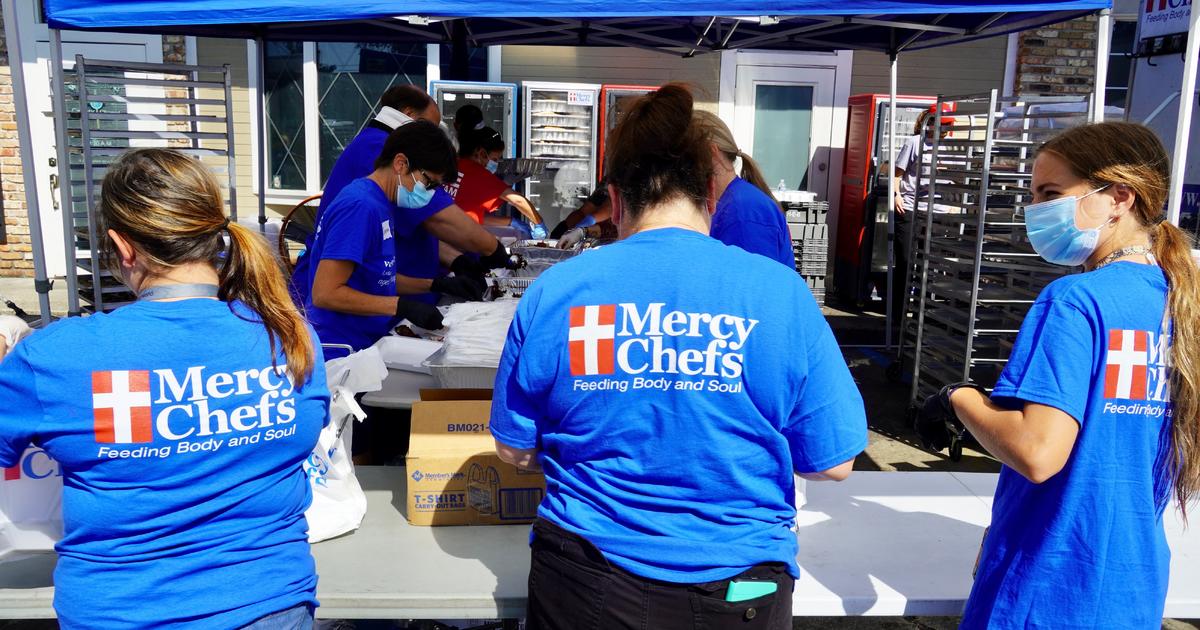Last month, Hurricane Delta became the fourth named storm to hit Louisiana this year, leaving residents and neighboring states with weeks of hard recovery efforts. Despite the difficult year, the disaster relief group Mercy Chefs is returning to the city where the hurricane made landfall, Lake Charles, to hand out meals for Thanksgiving.
“Across the board, within the nonprofits, this has been the most difficult year that anybody has ever seen,” said Gary LeBlanc, the organization’s founder. “The demands have been greater than we’ve ever seen and they’ve come more often than we’ve ever seen. In a year that’s been full of COVID, it’s been harder to raise funds than in any year before. At the time of our greatest need, we’ve had to face some dwindling support and we just have to go regardless.”
The Norfolk, Virginia-based organization provides restaurant-quality meals to disaster victims, first responders and volunteers by deploying mobile kitchens to areas ravaged by storms, serving thousands of warm meals each day. The group is on track to serve an estimated 6 to 7 million meals by the end of the year, LeBlanc said. “We think something amazing happens over a shared meal,” LeBlanc told CBS News. “You and I do it with our family and our friends. But to be in a disaster area, where folks have lost everything, and to be able to share a meal with them is the most rewarding thing that I can think of.”
Volunteers with Mercy Chefs preparing meals.
Ann LeBlanc/Mercy Chefs
LeBlanc’s drive to help others comes from his own experience with loss. In 2005, he and his family moved from New Orleans to Virginia. But when Hurricane Katrina hit, he lost his grandmother, his daughter lost her home and he saw a city he loved brought to its knees. “The people standing on bridges and in the news reports were people that I recognized, people that I had worked with,” said LeBlanc. “So I went and did the only thing that I knew how to do, feeding people.” LeBlanc returned to New Orleans, working with local groups to deliver food to hungry residents.
“I worked with all these other agencies and nonprofits and actually hated what I saw; and I got home and got angry about the way people were fed. I just believed there was a better way to feed people, something with more passion and more professionalism, more sanitation, more food safety. I just didn’t see that. I mean, 14 nights in a row, opening cans of cold green beans and just scooping green beans out of the pan onto a plate. It was not the way I believed that you should feed people that had just lost everything.”
After months of planning, the first Mercy Chefs outing took place in 2006, with just LeBlanc, his wife Ann and their two children. They helped a church in Conklin, New York, serve food to residents after a flash flood caused significant damage to the city. Nearly 14 years later, the group has enlisted 10,000 volunteers and has served over 8,000,000 meals.
Mercy Chefs isn’t just LeBlanc’s full-time job— it’s also his legacy. His daughter, Megan LeBlanc Beckman, still remembers that first Mercy Chefs outing. Now an adult with a family of her own, she told CBS News that watching her father build Mercy Chefs made her who she is today. “From a young age, my dad taught me that loving others and putting their needs above my own is the only way to live and that thinking has totally altered the way I live my life,” Beckman told CBS News. “His call 14 years ago to ‘just go feed people’ weighs heavily on his shoulders and it’s reshaped all of our lives forever, but his focus is still about serving precious individuals the very best food we can make.”
Gary LeBlanc
Ann LeBlanc/Mercy Chefs
This week, Mercy Chefs is returning to Lake Charles to distribute Thanksgiving meals to the community and the surrounding area. “We want to create an atmosphere not of celebration, but of recovery. For a lot of folks, it sort of gives them permission to get out of the mourning period and begin to recover emotionally to have that special event or that holiday event.”
“The thing that breaks my heart constantly is, we work hard, we feed more people, we see more people fed, but every time I feed a person, I see three more that I can’t get to,” said LeBlanc. “If I serve 10, I see 30. If I serve 30, I see a hundred. I am just driven to get to as many people as I can. I know I can’t get to everyone, but I have to get to everyone that I can.”
In the future, LeBlanc hopes to increase the number of meals they can serve. “Our team is tired, our equipment is beat up, and we’ve been stretched in every way possible,” he said. “We made the commitment earlier this year, we said, as long as the storms keep coming, Mercy Chef’s is going to keep going.”
